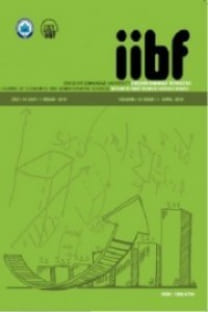Kripto Para Birimi Piyasalarında Etkinliğin Uzun Hafıza Ve Değişen Varyans Özelliklerinin Testi Yoluyla Analizi
Çalışmanın amacı, kripto para birimi piyasalarındaki fiyat hareketlerini etkinlik açısından değerlendirerek piyasanın geleceğine dair kritik noktalara ışık tutmaktır. Bu kapsamda piyasa etkinliğine dair uzun hafıza ve değişen varyans özellikleri test edilmiştir. Piyasa derinliği ve volatilite yapısı arasındaki ilişki, 8 kripto para birimi için asimetrik GARCH modelleri kullanılarak incelenmiştir. Analiz bulguları, kripto para piyasalarında uzun hafıza özelliğinin varlığını ortaya koymaktadır. Buna ek olarak, elde edilen bulgulara göre, tüm kripto para birimleri için işlem hacmi arttıkça volatilitede azalma gözlemlenmektedir. Dolayısıyla, piyasa etkinliğinin tüm kripto para birimleri için piyasa derinliğiyle birlikte arttığı sonucuna ulaşılmaktadır. Bu çalışma, güncel finans literatürünün en tartışmalı konularından birisi olan kripto para piyasalarının geleceğine dair sinyallere işaret etme aracılığıyla literatüre katkı sağlamaktadır.
Anahtar Kelimeler:
Finans, Kripto para, Fintek, GARCH
Testing the Market Efficiency in Crypto Currency Markets Using Long-Memory and Heteroscedasticity Tests
The purpose of this study is to shed light on the critical points of the future of the crypto currency market by evaluating the price movements and market efficiency. In this context, efficiency structure of the market has been tested for long-memory and heteroscedasticity characteristics. The relationship between market depth and volatility structure has been tested for 8 crypto currencies using asymmetrical GARCH models. Results of the analysis indicate presence of long-memory characteristics. Additionally, that as market volume increases so does the efficiency of the market. Therefore, it is concluded that the market efficiency increases with the market depth for all tested crypto currencies. This study contributes to the literature by pointing out the signals about the future of the crypto currency markets, which is one of the most controversial issues in the current finance literature.
Keywords:
Finance, Cryptocurrency, Fintech, GARCH,
___
- Baillie, Richard T; Tim Bollerslev; Hans Ole Mikkelsen (1996), “Fractionally integrated generalized autoregressive conditional heteroskedasticity”, Journal of econometrics, Vol.74 No.1: 3-30.
- Balcilar, Mehmet; Elie, Bouri; Rangan Gupta; David Roubaud (2017), “Can volume predict Bitcoin returns and volatility? A quantiles-based approach”, Economic Modelling, Vol.64 No.1: 74-81.
- Barkoulas, John T; Christopher, F. Baum; Nickolaos Travlos (2000), “Long memory in the Greek stock market”, Applied Financial Economics, Vol. 10 No. 2: 177-84.
- Bollerslev, Tim; Robert, F. Engle; Daniel B Nelson (1994), “ARCH models”, Handbook of econometrics, Vol. 4 No.1: 2959-3038.
- Bollerslev, Tim; Hans, Ole, Mikkelsen (1996), “Modeling and pricing long memory in stock market volatility”, Journal of econometrics, Vol. 73 No.1: 151-84.
- Burton, John (1987), “Privatization: the thatcher case”, Managerial and Decision Economics, Vol. 8 No.1: 21-29.
- Cheah, Engtuck; John, Fry (2015), “Speculative bubbles in Bitcoin markets? An empirical investigation into the fundamental value of Bitcoin”, Economics Letters, Vol. 130 No.1: 32-36.
- Cheung, Yin‐Wong; Kon, S. Lai (1993), “Finite‐sample sizes of Johansen’s likelihood ratio tests for cointegration”, Oxford Bulletin of Economics and statistics, Vol. 55 No.3: 313-28.
- Cheung, Yin-Wong; Kon, S. Lai (1995), “A search for long memory in international stock market returns”, Journal of International Money and Finance, Vol.14 No.4: 597-615.
- Ding, Zhuanxin; Clive, WJ. Granger; Robert, F. Engle (1993), “A long memory property of stock market returns and a new model”, Journal of empirical finance, Vol.1 No.1: 83-106.
- Engle, Robert, F. (1982), “Autoregressive conditional heteroscedasticity with estimates of the variance of United Kingdom inflation”, Econometrica: Journal of the Econometric Society, Vol.1 No.1:987-1007.
- Fama, Eugene, F. (1965a), “Portfolio analysis in a stable Paretian market”, Management science, Vol.11 No.3: 404-19.
- Fama, Eugene, F. (1965b), “The behavior of stock-market prices”, The journal of Business, Vol.38 No.1: 34-105.
- Fama, Eugene, F. (1970), “Efficient capital markets: A review of theory and empirical work”, The journal of Finance, Vol.25 No.2: 383-417.
- Gandal, Neil; Hanna, Halaburda (2016), “Can we predict the winner in a market with network effects? Competition in cryptocurrency market”, Games, Vol. 7 No.3: 16.
- Granger, Clive, WJ.; Roselyne, Joyeux (1980), “An introduction to long‐memory time series models and fractional differencing”, Journal of time series analysis, Vol.1 No.1: 15-29.
- Hosking, Jonathan, RM. (1981), “Fractional differencing”, Biometrika, Vol.68 No.1: 165-76.
- Kayalıdere, Koray; Hakan Aracı; Hüseyin Aktaş (2012), “Türev ve spot piyasalar arasındaki etkileşim: VOB üzerine bir inceleme”, Muhasebe ve Finansman Dergisi, C.56 S.1: 137-54.
- Lahmiri, Salim (2015), “Long memory in international financial markets trends and short movements during 2008 financial crisis based on variational mode decomposition and detrended fluctuation analysis”, Physica A: Statistical Mechanics and its Applications, Vol.437 No.1: 130-38.
- Mensi, Walid; Shawkat, Hammoudeh; Sang, Hoon, Kang (2015), “Precious metals, cereal, oil and stock market linkages and portfolio risk management: Evidence from Saudi Arabia”, Economic Modelling, Vol.51 No.1: 340-58.
- Tse, Yiu Kuen; (1998), “The conditional heteroscedasticity of the yen-dollar exchange rate”, Journal of Applied Econometrics, Vol.1 No.1: 49-55.
- Turgutlu, Evrim (2004), “Fisher hipotezinin tutarlılığının testi: parçalı durağanlık ve parçalı koentegrasyon analizi”, DEÜ İİBF Dergisi, C.19 S.2: 55-74.
- ISSN: 1306-6730
- Yayın Aralığı: Yılda 3 Sayı
- Başlangıç: 2006
- Yayıncı: Eskişehir Osmangazi Üniversitesi İktisadi ve İdari Bilimler Fakültesi
Sayıdaki Diğer Makaleler
Zeliha KAYGISIZ ERTUĞ, Emrah Göksel
Türkiye’de Cepten Yapılan Sağlık Harcamalarının Belirleyicileri: Koşulsuz Kantil Regresyon
Sosyolojik Bir Kategori Olarak Heterodoks İktisat
Kaldıraç ve Döngüsellik: Bankacılık Sektörü Üzerine Bir Uygulama
q-Faktör Modelinin Borsa İstanbul’da Geçerliliğinin Test Edilmesi
Türkiye Tarım Kredi Kooperatifleri için Kurumsal Performans Karnesi Önerisi
Abdulkadir FASAL, Özlem BALABAN
Gelişmekte Olan Ülkelerin Finansal Derinleşme Açısından Sınıflandırılmasına İlişkin Bir Uygulama
Kurumsal Sosyal Sorumluluğun İnovasyon ve Firma Değeri Arasındaki İlişkide Aracılık Etkisi
Tülin URAL, Songül KAKİLLİ ACARAVCI, Oğuz OYPAN, Yunus KARAÖMER
